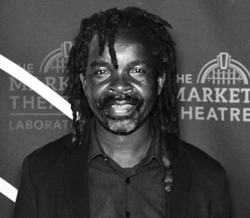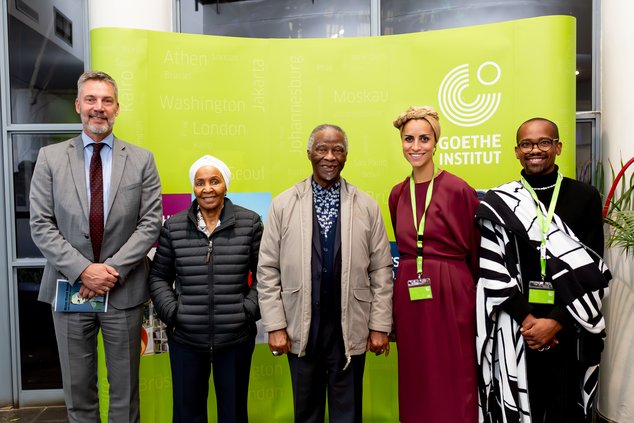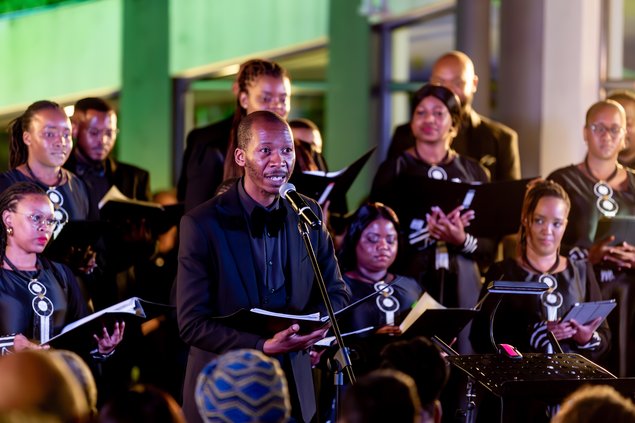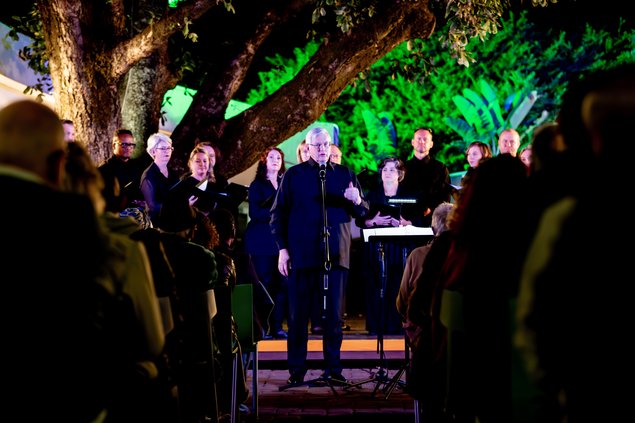Moerane Critical Edition Concert at Goethe-Institut Johannesburg enthralls audience
The two choirs led by classical music maestro and celebrated conductor Richard Cock and Sabelo Mthembu sampled from the late composer Michael Mosoeu Moerane’s new compositions that have not been performed before, as well as his popular compositions often performed by several choirs around South Africa.
By Edward Tsumele

The name of Michael Mosoeu Moerane may not be on the lips of the public beyond choral and academic circles, but on Tuesday, October 17, his presence loomed large in the Goethe- Institut gardens in Parkwood, where some of his lesser known compositions were performed to much appreciation by the audience.
Even the birds, that usually make their own music on tree tops around the leafy surrounds of the Goethe-Institut, especially in the evening, (Conductor Richard Cock observed) gave way to the sweet sounds of the two choirs conducted by classical music maestro and celebrated conductor Richard Cock and impressive conductor Sabelo Mthembu as they sampled several pieces from Moerane’s compositions, both well-known and those lesser known till now.

Deputy Ambassador Enrico Brandt; Mrs. Zanele Mbeki; former President Thabo Mbeki, Dr. Asma Diakité Regional Head of Cultural Programmes at the Goethe-Institut, Bongani Njalo Cultural Programs Coordinator.
The event, which was attended by luminaries in society, including former President Thabo Mbeki and his brother Moeletsi Mbeki and their families (Moerane was Mbeki’s uncle from his mother’s side) was a memorable event that will remain etched in the minds and consciousness of the audience that was there. More importantly, perhaps, what will be more immortalized in the minds of that audience is the name Moerane and his prolific compositional skills, and the rich legacy of real good music that he has left behind, from which many a choir can still tap from and are actually doing so up to a certain extent today.
However, as the person behind this initiative, Professor Christine Lucia pointed out in her opening remarks, his extensive repertoire still needs to be explored, beyond the few popular ones that choirs often sample from.
“By now there should have been hundreds of Moeranes, developing, down the decades, a continually changing tradition of choral and classical composition that is distinctly African and distinctly from this region of Africa. When I hear music and voices such as we will hear tonight, however, and when I think what an important educational tool Moerane provided in his music as well as what food for the soul he has given us, my hope, nonetheless is renewed,” she reflected and gave way for the music to commence. And commence it did in a specular way, taking the audience along a meditative route that connected them with the spirit of the late composer for about an hour of sheer ecstasy.

The two choirs, that is the Cock led choir called Chanticleer and the Mthembu’s called Quava Vocal Group, delved deep into Della, the new version composition that till now, has not been performed before, as it is one of the several songs that have been excavated by Professor Lucia and her team of researchers in a quest to find the hidden gems that Moerane left behind.
From then on, the two choirs took turns to perform individually some of the most beautiful choral music compositions, and then finally performed together again to wind down the concert, conducted by Cock. The audience applauded as they appreciated an evening of good music and good company.
By that time, the audience had been blessed by compositions such as Seotsanyana, Ma-Homemakers (that Moerane may have co-composed with his wife), Mahakoe, Matlala, Nobody Knows the Trouble, I got a Home in-a Dat Rock (the two inspired by American spiritual music sung by slaves), Sylvia, Go Tell it on the Mountain and finally the popular Ruri, that is often sampled by choirs around South Africa.
Interview with Professor Christine Lucia
The concert would not have been complete without an interview with the person behind the retrieving of these beautiful almost lost pieces of music left behind by Moerane, Professor Christine Lucia, to shed more light about this initiative.
Edward Tsumele: Choral music plays an important role in the evolution of South African music, particularly as an entry into classical music by particularly black musicians. What role did the choral pieces by Moerane play in developing the appreciation of choral music in the country?
Prof. Christine Lucia: In the absence of any meaningful school music education for the majority of South Africans, choral music is tremendously important, and has been for more than a century. Moerane was known until now principally by works such as Sylvia, Della, Morena Tlake, Matlala, and Ruri, but these are composed in a style that combines western late romanticism and modernism with African syncopations and the musical language is far more complex than that of most other choral music composers. As a result, his works are very challenging to sing. Moerane was well aware of the need to ‘teach’ through his songs, and so they are full of elements of basic music theory: keys, scales, intervals, chords, modulations, different time signatures, simple and complex rhythms, varied textures. All of this must have had some impact, however small, on developing greater appreciation of music in the country.

Edward Tsumele: An artist like Moerane, going by the number of choral pieces that he composed in his life time, should be a celebrated name in music in general and choral music in particular. At face value, it would appear that it is not the case. Why do you think that is so and what do you think must be done to correct, such a situation, a misnomer actually?
Prof: Christine Lucia: It is partly because so few works of him were known until now (with the new edition), partly because he is of a certain generation: he was born in 1904 and died in 1980. And I think partly, too, because of the challenge of singing his music.
Edward Tsumele: Many among the general public, particularly followers of choral music, will be surprised not to have known, perhaps till now, that there is a deep well of choral pieces submerged somewhere that they did not know about, and how was that well discovered? I mean 80 choral compositions represent a substantial amount of someone’s intellectual property. Any broad reflections on that statement?
Prof. Christine Lucia: Lots of choral composers wrote huge repertoires! Not only Moerane. Mohapeloa, for example, wrote 145 works, Shalati Khosa wrote hundreds. However, because these works are confined to choral competitions and the domain of “prescribed music”, people just don’t know a composer’s output in its totality. They just know a couple of pieces, which are sung over and over again. My research aims to make these whole repertoires available. This is important, because these works represent a hidden African Music History, and because when you see the whole sweep of what someone composed, you get a much better sense of the varying styles within the choral sector. It is a gold mine. Someone should have done what I’m doing long before now! And I hope they will now begin to do it more and more.
Edward Tsumele: How did you know and how did you get involved in the resurfacing of what I would for the lack of a better word, describe as hidden gems in the choral music canon?
Prof. Christine Lucia: I met Joyce Mohapeloa in 2006 and through her I found out about all the works of Mohapeloa. I then wanted to research Moerane because I loved his orchestral work, Fatse la Heso, and Ruri. I found a dream translator and research assistant, Mrs Mpho Ndebele, and put in a proposal for the Moerane Edition at Africa Open Institute, and then Mrs Ndebele began to find Moerane family members and former students for me to interview. Among the first of these was Mr Thuso Majalla Moerane of Queenstown, the composer’s son, who, much to my great surprise and joy, had kept safe for many years the majority of Moerane’s song manuscripts. He gave permission for my work to continue, by publishing them, and I still work in conjunction with his son, Tsepo.
Edward Tsumele: Certainly this should be the first step in popularising and bringing to the public more of Moerane’s compositions. Are there any plans going forward in that regard post this event?
Prof. Christine Lucia: I would love someone to create a new CD of Moerane’s music, based on the Moerane Edition – which has even shown that works we know and love are not quite what was originally composed. But I think someone else should do this.
Edward Tsumele: Is there something else that I may not have asked that you think the public should know about Moerane in general and this initiative in particular?
Prof. Christine Lucia: Many people do not know about that Moerane also composed a beautiful orchestral work, Fatshe la Heso (My Country), which should be frequently performed by South African orchestras and is not. It is based on Sotho folk themes, and the title refers to Lesotho, to which Moerane belonged culturally and with which he identified strongly. Most people do not know, too, that he was an activist, albeit a quiet one.

He was expelled from Queenstown Bantu Secondary School in the late 1950s for example, and forced into exile in Lesotho. There he taught English Literature and History at Peka High School in the 1960s, and among his many successful pupils there, by the way, is novelist Zakes Mda. He is buried in Lesotho, although he was born in the Eastern Cape. There are many things people do not know about him, but not only about him, about all the wonderful choral composers in southern Africa, as composers. One final point: his music is still in copyright, as is the music of dozens of other composers registered at SAMRO, and they should earn more royalties than they do, from the many, many performances of their music by choirs.
This Moerane debut Critical Edition Concert was hosted by Goethe-Institut in Johannesburg, in partnership with the Johannesburg, International Mozart Festival and the Africa Open Institute, Stellenbosch University.
The Goethe-Institut is the Federal Republic of Germany’s cultural institute, active worldwide. The Goethe-Institut promote the study of German abroad and encourage international cultural exchange. The Goethe-Institut Johannesburg supports local South African projects, as well as regional exchange within Africa, and continues to facilitate engagement with Germany.
“Our Cultural Programmes Department focuses on a variety of different artistic approaches from the visual arts to drama, dance, literature, film, and others. Our goal is to support the local cultural scenes and strengthen pan-African dialogue through the arts,” says Dr. Asma Diakité Regional Head of Cultural Programmes at the Goethe-Institut.










